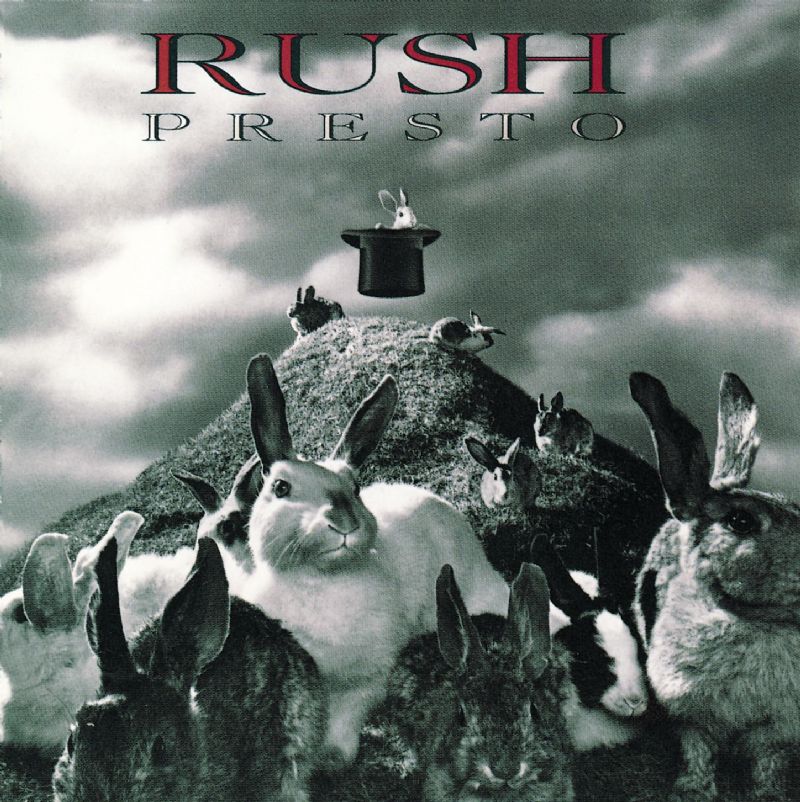
Presto (1989)

1.Show Don't Tell
2.Chain Lightning
3.The Pass
4.War Paint
5.Scars
6.Presto
7.Superconductor
8.Anagram (For Mongo)
9.Red Tide
10.Hand Over Fist
11.Available Light
It might seem quaint now, but when Presto was released, it marked the longest gap between Rush studio albums. A full two years — an eternity by the standards of the day. Yes, there had been a live album earlier that same year, but with no internet or 24/7 media machine to keep fans abreast of every studio session and lyric tweak, speculation began to circulate. Were they still together? Were they still writing? Had Rush, of all bands, quietly called it quits?
Not so. The band returned, very much intact, albeit with yet another new direction in mind. And, predictably, not everyone approved. Presto saw the band shedding most of the synthesizers and electronic gloss that had defined their previous handful of records. But this wasn’t a return to their early '70s roar either. The album is stripped back in some respects — acoustic guitars, piano textures, and an almost airy openness in the mix — yet it remains unmistakably Rush.
Once again, a new producer is brought in — this time Rupert Hine — whose influence is heard immediately on the opening track, Show Don't Tell. A curious choice for a lead-off number. Unlike their usual album openers, it doesn’t come charging out of the gate. Instead, it simmers, builds, unfolds. It’s not that the song is weak — far from it — but it does ask the listener for patience. A request that, for many, would become the theme of the entire album.
Much has been made of the production. Critics and fans alike have noted a certain thinness to the overall sound. These aren’t incorrect observations, but the context is important. This was still the era when bands were chasing clarity over crunch. Grunge had yet to break through and rewrite the sonic rulebook. Rush were simply navigating the standards of the late '80s — and doing so, one must add, while beginning a new chapter with Atlantic Records. That deal likely came with some gentle nudging toward accessibility, and perhaps some hope of broader commercial exposure. (Which, as history shows, never quite materialized.)
So — is it any good? That question still divides the fanbase. But for those willing to give it time, Presto reveals itself as one of Rush’s most rewarding and musically graceful efforts. The melodies are, in places, sublime. The arrangements — while often understated — showcase a band at peak instrumental maturity. Lee’s bass tone is sharp and precise. Lifeson, freed from competing with walls of keyboard, weaves both electric and acoustic textures with finesse. Peart, as always, remains technically flawless, but here, his playing is tastefully restrained.
And yet, there is no central theme to tie the work together. Peart’s lyrics, still thoughtful and erudite, feel more like a collection of independent meditations than a unified message. This is not necessarily a fault — only a shift in approach. Even the album title, it turns out, came about through a leftover idea. Peart had wanted to use Presto as the title for their last live release, only to be voted down. So here it finds a home — giving the album a sort of retrospective purpose it might otherwise lack.
Fans were relieved that the overt '80s tropes were gone. But others remained unsatisfied, citing the lack of sonic punch. Such is the life of a band that reinvents itself every few years: someone is always disappointed. Yet time has been unusually kind to Presto. What once felt like a transitional work now stands as a deeply personal and reflective album — one that rewards repeat listens and patient ears.
No, it doesn’t thunder. But it resonates. And in its own quiet way, it remains one of Rush’s most distinctive — and enduring — statements.
Go back to the main page
Go To Next Review